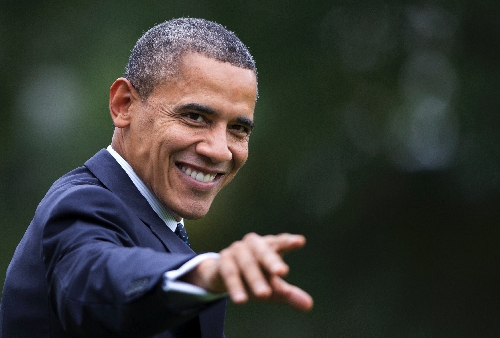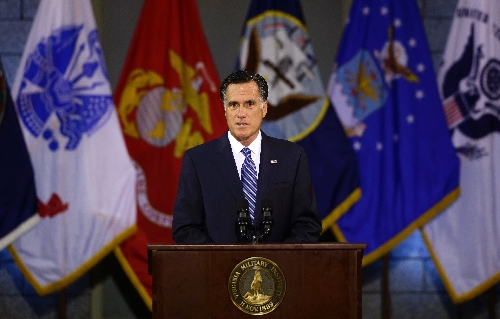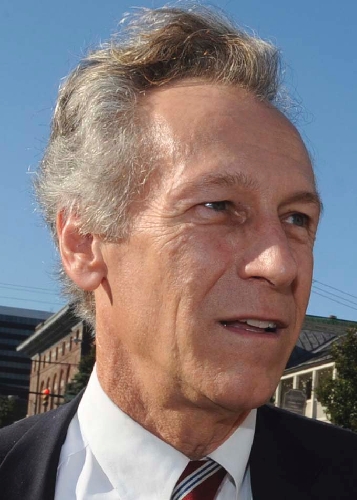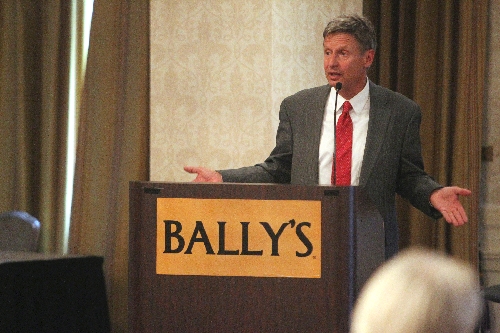2012 Voter Guide: U.S. President
Chances are high that Nevada voters in the Nov. 6 election will determine whether President Barack Obama gets a second term or Republican challenger Mitt Romney replaces him in the White House.
Although the Silver State has a small number of Electoral College votes - six of the 270 needed to win the White House - the race is so close that the state's 1.2 million registered voters could make the difference.
That's why Obama has campaigned in Nevada far more often than any president before him, making at least 16 visits since he took office in January 2009 and eight this year alone. And that's why Romney has come here at least half a dozen times since the spring, using Las Vegas stops to unveil his economic and housing plans.
Nevada counts more than in any previous election, making it one of the top battleground states in a contest that centers on the pace of the economic recovery after the worst recession since the Great Depression.
The White House race also asks voters to make a choice between two very different political philosophies. Obama has expanded government programs and their reach, including with his mandatory health care insurance law, while Romney wants to cut back on federal control and spending as the nation's debt hits a record $16 trillion.
Romney also has argued for reform of Medicare for future retirees older than 55. He picked as his vice presidential running mate U.S. Rep. Paul Ryan, R-Wis., the architect of a GOP plan that would shift Medicare to a voucherlike reimbursement plan - a scheme Democrats say would "end Medicare as we know it."
While the Nov. 6 focus is on the top of the ticket, the presidential race also will affect the outcome of election contests on the rest of the ballot, including the close Senate race between U.S. Sen. Dean Heller, R-Nev., and U.S. Rep. Shelley Berkley, D-Nev. Also at stake are Nevada's four congressional seats, including a new one in Southern Nevada, and control of the Democratic-led Nevada Legislature as Republicans try to take over the state Senate.
The better Obama does to get Democrats to the ballot box, the better the chances are for the rest of his party, particularly in Southern Nevada where Democrats dominate and 70 percent of the population lives.
"If you get a great big turnout in Clark County, that's good news for Berkley and bad news for Heller," said Eric Herzik, a political science professor at the University of Nevada, Reno.
At the same time, casting a vote for Obama doesn't guarantee a voter will fill out the rest of the ballot and doesn't guarantee a Democratic win in other races since independent-minded Nevadans are known for crossing party lines.
"Nevada is the champion ticket-splitting state," Herzik said. "And we've seen this before."
In 2010, for example, voters overwhelmingly backed Republican Brian Sandoval for governor yet also returned U.S. Sen. Harry Reid, D-Nev., to the U.S. Senate, in a year dominated by the GOP.
No matter who wins, the state of the economy is Nevada voters' top concern and will decide the outcome.
As the state with the highest unemployment rate in the nation at 12.1 percent, Nevada residents have suffered more than other Americans on every front, including with record home foreclosures and personal bankruptcies.
In his frequent visits, Obama has pleaded for more time for his policies to lift the middle class. He wants to end Bush-era tax cuts for households making $250,000 or more a year so that the rich "pay their fair share."
"I believe in you and I'm asking you to keep on believing me," Obama said in a Sept. 30 visit where he spoke to more than 11,000 supporters at an outdoor rally at Desert Pines High School. "I'm asking for your vote. I'm asking you to stand with me. And if you stand with me and work with me, we will win Clark County again. We will win Nevada again. We will win this election again."
Romney, a former Massachusetts governor and head of Bain Capital, has countered that his experience in business makes him better equipped to turn around the nation's economy. He said he will create 12 million jobs in his first term by keeping taxes low and steady, promoting small business and energy development and reducing regulations. That compares with 5 million private-sector jobs Obama said he has added in his first term amid the recovery.
"We're going to make it happen," Romney said on Sept. 21 when he spoke to more than 3,000 supporters at the Cox Pavilion at the University of Nevada, Las Vegas. "I need you to get me elected in November."
Indeed, a statistical study in early October by The New York Times' Nate Silver found that Nevada was among the top "tipping point" states that could determine the outcome of the race, after Ohio and Virginia.
In fact, Nevada led the rest of the states in the "relative likelihood that an individual voter would determine that Electoral College winner," according to The New York Times study.
Nevada has a near perfect, modern-day track record for picking presidents. In the past century, the state voted for the winner every time except 1976 when Nevada voted to re-elect Gerald Ford and Jimmy Carter won.
By the numbers, Obama has the advantage in Nevada. Registered Democrats outnumber Republicans about 90,000 statewide thanks to an advantage of about 127,000 in Clark County at press time. The 218,000 Nevada voters who are registered nonpartisans could make the difference for Romney, who's polling better among independents.
Four years ago, when Obama won with historic levels of support among young, first-time voters, the Democratic Party held an advantage of 100,000 registered voters over Republicans in Nevada. As a result, Obama won the state by 12 percentage points, a margin he can't match this year with polls showing the 2012 race to be a near dead heat.
Obama is hoping his advantage with minorities, both African-Americans and Latinos, will give him the winning edge on Nov. 6. Hispanics make up about 26 percent of the Nevada population and nearly three-quarters of Latino voters favor the president over Romney, according to most recent surveys.
Republicans have been reaching out to Latinos, Asians, African-Americans and other minority groups to close the gap, and are counting on anger over Obama's economic policies to push Romney over the finish line first.
Herzik said the question is whether the GOP enthusiasm to get rid of Obama will overcome a more organized Nevada Democratic Party voter turnout machine, which is helped by thousands of union forces.
"The presidential race reflects Nevada's position as a swing state," Herzik said. "Since the 1990s the two parties have been pretty evenly balanced. So it all comes down to Election Day and who gets their voters to the polls."
For voters who don't like Romney or Obama, there are three other choices on the ballot.
Two of the picks are Libertarian presidential nominee Gary Johnson, a former New Mexico governor, and Virgil Goode, the Independent American Party nominee and a former congressman from Virginia. In Nevada, voters also can choose "None of these candidates" to express their displeasure at the ballot box.
Johnson, a former Republican who dropped out of the GOP primary to run as a Libertarian, was a popular governor who served two terms. A fiscal conservative, he believes in limited government, low taxes and a much smaller noninterventionist military. Johnson is liberal on social issues and advocates legalizing drugs such as marijuana.
"I don't see Obama as being any different than Romney," Johnson said in an interview. "If either one of them is elected, we will find ourselves in a heightened police state and our military intervention is going to continue to grow. Regardless of who's elected, we're going to find ourselves with unsustainable spending and debt."
Goode said he's the only candidate who wants to halt immigration, both legal and illegal, until the nation gets the situation under control. Now, an estimated 12 million undocumented immigrants live in the United States.
"If we have Romney or Obama, we're going to continue to have a flood of foreign citizens coming into this country and taking our jobs," Goode said in an interview, calling for a green card moratorium.
Goode also wants to cut and balance the federal budget to stem the nation's growing debt. A member of the Constitution Party, he also believes in limited government and greater political freedom.
Goode has a varied political party history. He was a member of the Democratic Party when first elected to the House in 1996. But he fell out of favor after he voted to impeach then-President Bill Clinton. He became an independent and won re-election in 2000. In 2002, he won re-election as a Republican. He won several more terms as a Republican, but lost re-election in 2008 when Democrats dominated in the Obama wave election.
"My positions have never changed" despite the party switching, he said. "I've always been conservative."
Contact Laura Myers at lmyers@reviewjournal.com or 702-387-2919. Follow @lmyerslvrj on Twitter.
Voter Guide
News stories on races on 2012 ballot
Presidential Duties, Pay
The president leads the executive branch of the federal government. He is commander in chief of all U.S. military forces. He has the power to grant reprieves, grant appointments to his Cabinet and other top federal offices, and to veto bills given him by the Senate and House of Representatives. He serves a four-year term. Annual salary is $400,000

















